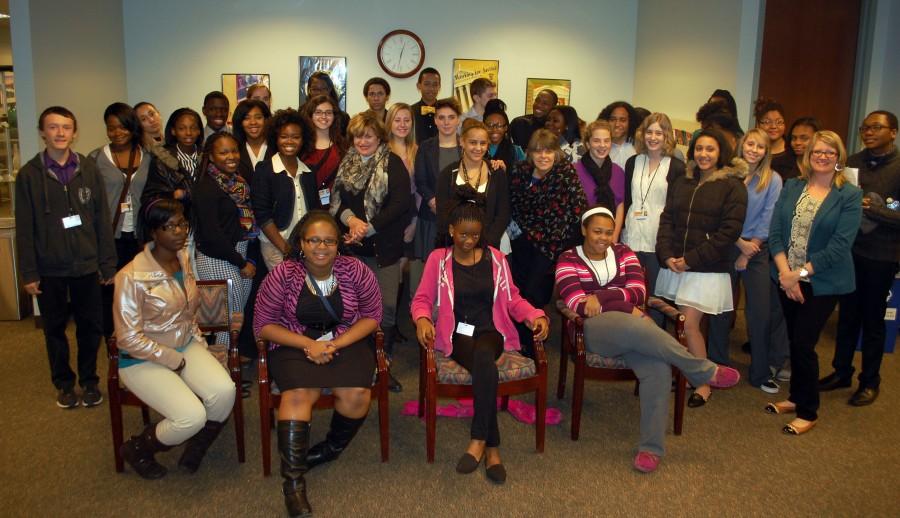It isn’t every day that students have the opportunity to meet someone right out of their history book. However, that’s exactly what happened for a group of journalism and government students Nov. 20 when they had the opportunity to meet Mary Beth Tinker at the Eagleton Courthouse.
Tinker, who as a student was a plaintiff in a landmark first amendment rights case, spent the day with about 40 students from U. City as part of her cross-country tour with lawyer Mike Hiestand to teach students about their rights and the importance of making their voices heard.
The day began in the jury assembly room of the courthouse, where students were served donuts and juice. Catherine D. Perry, Chief U.S. District Judge, made a brief welcome speech about the importance of Tinker’s 1969 Supreme Court case, Tinker v. Des Moines Independent Community School District.
“It was kids just like you who came to a court just like this to get relief,” she said. “Someone just like you could change the world and make it much better for the people who follow.”
Tinker, the main attraction of the day, then took the floor. She began by lauding kids’ willingness to stand up for their beliefs.
“All through history, young people have been standing up for our rights. There’s something about you guys that you notice things that aren’t right,” she said. Because children and teens have a tendency to imagine more, she said, “You can imagine a better world and help us get there.”
Tinker went on to share her story from her childhood to the Supreme Court case that now makes her famous. It began in the 1960s, a time of great change as the nation confronted segregation, environmental issues, and the Vietnam War.
“I was surrounded by strong, brave people,” she said, including her parents, both active protestors. She never planned to imitate them, though.
“I’m not like that,” she remembered telling them. “I’ve got to study for my math class. I was a top student.”
However, in 1965, when Tinker was 13, her older brother John and one of his friends convinced her to join several students in protesting the Vietnam War by wearing black armbands to their school in Des Moines, Iowa.
Two days before the planned protest, the school administration caught wind of it and forbade armbands, saying that any student caught wearing one would be suspended. Tinker was nervous, but she wore it anyway to be like the brave people she knew.
“I walked down the hall with my armband and I was so scared,” she said.
Over the next few days, she and the other students were all suspended.
The ACLU heard of the case and offered its help. The judges ruled for the school board, and they appealed in the very courthouse where she was now speaking to U. City students.
After the first loss, Tinker said, “[I thought,] Of course we’re going to lose the case because kids don’t have rights.”
However, the tide soon began to turn. The appeals court tied, sending the case to the Supreme Court.
Meanwhile, Tinker had continued on with her life. By the time they reached the Supreme Court, she was a junior at U. City, where her family had just moved.
The court finally ruled 7-2 in the Tinkers’ favor that February.
“I was amazed,” Tinker said. “I was just so surprised.”
After the ruling, Tinker went back to living a normal life. She graduated from U. City in 1970 and became a nurse. It wasn’t until she saw her case in her nursing book that she really understood how important it had been, she said.
Tinker decided to quit her job a few months ago to go on the Tinker Tour. She has enjoyed traveling the country and hearing what issues kids are standing up for today, she said. She passed around a notebook and asked students to write down the ways they have spoken up for their beliefs.
After Tinker’s speech, students toured two empty courtrooms, the Eastern Missouri District Court and the Eighth Circuit Court of Appeals, which is where the Tinker case was appealed. A court clerk in the appeals court talked a bit about the legal aspects of the Tinker case.
Back in the jury room, Hiestand, a lawyer for the Student Press Law Center and Tinker’s companion on the tour, discussed the legal implications of the Tinker case.
“Mary Beth’s case is where student press law begins,” he said. It protects student speech from censorship, he said, as long as it does not create serious, physical disruptions or invade the rights of others.
Since the Tinker decision, however, more restrictions have been added to student speech, and Hiestand went on to explain what this meant for students, especially student journalists.
“You’ve got to know your rights if you’re going to exercise your rights,” he said.
At noon, there was a break, and students were able to speak to Tinker one-on-one during lunch. Tinker didn’t hesitate to give out more information or her email address to those who were interested.
Finally, goodbyes were said, and students went on to the final activity: a scavenger hunt in the courthouse’s Judicial Learning Center. Before long, everyone was back on the bus to school.
Students said they gained a lot from the field trip. Jihira Patton, sophomore, was one of them.
“I thought the field trip was very informative. I learned a lot of things [about] my rights,” she said. “My favorite part was when we did the court tour and got to see a real courtroom. I was very fond of it because I want to be a lawyer when I grow up.”
Daniel Williamson, sophomore, hoped to use his newfound knowledge in his newspaper class.
“I definitely will feel like I have more liberty to write and express myself through writing more,” he said. “And just in general, if I see something I don’t agree with politically, I feel more rebellious towards it now.”
[slideshow id=65 w=400 h=300]
































